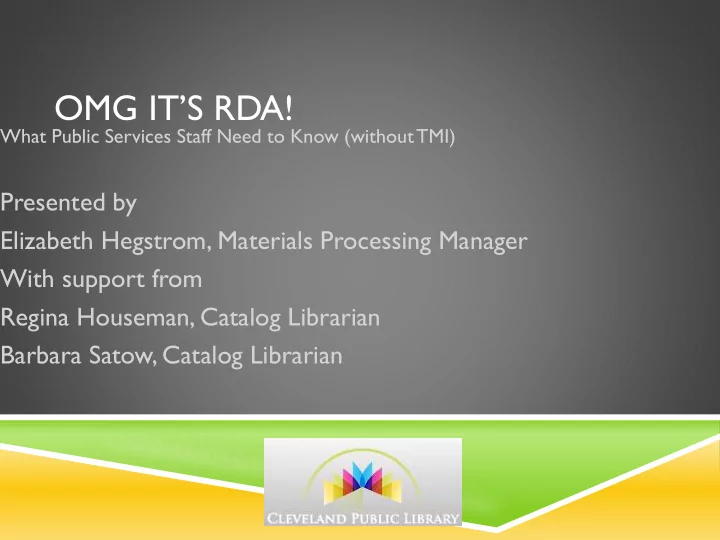

OMG IT’S RDA! What Public Services Staff Need to Know (without TMI) Presented by Elizabeth Hegstrom, Materials Processing Manager With support from Regina Houseman, Catalog Librarian Barbara Satow, Catalog Librarian
WHAT IS RDA? Resource Description and Access Replaces Anglo-American Cataloging Rules, 2 nd edition (AACR2) Written for web environment Clearly indicates relationships Can support integration of library catalog data with other metadata producers Based on internationally established principles, standards and models
WHY DID THEY CHANGE THE RULES? AACR2 was written in 1977 AACR2 was card based Possibility of bringing in information from other sources (Publishers, web designers, etc.)
INVENTED SINCE AACR2 WAS WRITTEN CDs (1982) CD-ROMs (1985) DVDs (1995) THE INTERNET (1995)
THE CONFUSING STUFF THAT IS HELPFUL TO KNOW
THEORY BEHIND RDA FRBR FRAD
RDA IS BASED ON FRBR Functional Requirements for Bibliographic Records FRBR seeks to fulfill the following user tasks: Find Identify Select Obtain
FRBR’S ENTITY -RELATIONSHIP MODEL Work Expression Manifestation Item
WORK Mark Twain has the idea for a story about a young boy named Tom Sawyer. Tom lives with his aunt in Missouri. The story will follow some of his adventures.
EXPRESSION Writing it down creates the first expression Expression can be the story In written words Spoken On film Any way in which another person can experience the story
MANIFESTATIONS
ITEM
FRAD Functional Requirements for Authority Data Extends the FRBR model to authority data Relates to persons, families or corporate entities Uses more identifiers to uniquely identify persons, families or corporate entities
WHAT FRAD ALLOWS Families can be considered authors Animals are now considered ‘persons’ Bo the dog could be the ‘author’ of a tell -all book about the Obama presidency Fictitious persons or animals can now be considered ‘authors’ Geronimo Stilton (and his sister Thea) Jessica Fletcher
SO WHAT DOES THIS MEAN? Bibliographic records will look different, the way information is given has changed
SOME OF THE CHANGES IN BIBLIOGRAPHIC RECORDS Abbreviations are no longer used (it is believed the patrons can’t understand them, OMG LOL) Use of [sic] for misspellings discontinued Only required to list one creator (author) but can list all no matter how many Relationship designators are included (author, illustrator, actor, production company, translator, etc.) as opposed to the 3 letter codes that are occasionally included now
SIRSIWORKFLOWS EXAMPLE WITH REALTIONSHIP DESIGNATORS
BIGGEST CHANGE General Material Designator (GMD, |h) is replaced with: 336 Content type (sounds, two-dimensional moving images, text, etc.) 337 Media type (audio, video, microform, computer, unmediated [can be experience without machine], etc.) 338 Carrier type (audio disc, video disc, online resource, sheet, volume, etc.)
SAMPLES OF 336-338 Books 336 text 337 unmediated 338 volume Sound Recording 336 performed music (or spoken word) 337 audio 338 audio disc
EXAMPLES OF 336-338 DVD 336 two-dimensional moving image 337 video 338 videodisc Ebook 336 text 337 computer 338 online resource
WHERE WE ARE NOW Library of Congress adopted March of 2013 Combination of ‘old’ AACR2 records and RDA Some hybrid, or combination, records available in OCLC and will be brought into ILS system Not all ILS systems can deal with RDA records Not all ILS systems can properly display RDA records in MARC ILS providers have been taking a ‘wait and see’ attitude There is no plan to upgrade the existing AACR2 records RDA doesn’t work well in MARC, BibFrame is intended to replace MARC in the future
QUESTIONS?
Recommend
More recommend